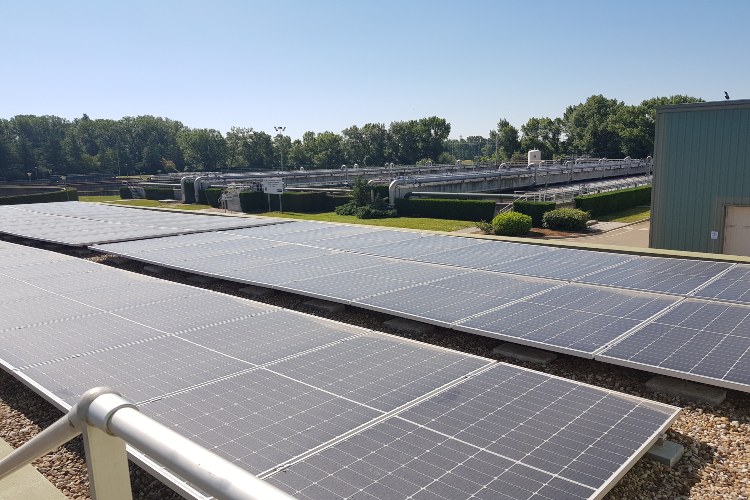Aquona will reduce 45% of its emissions in 2030
The company has a climate strategy aligned with the UN 2030 Agenda that it has deployed in the cities and municipalities where it is present.

On October 24, the International Day Against Climate Change is celebrated, with the aim of mobilizing and sensitizing society - governments, companies, organizations, citizens - about the effects of climate change and the serious danger that global warming entails on the planet. In addition, the climate emergency has a direct impact on an essential resource for life such as water. The water cycle is increasingly variable, making it difficult to forecast the availability of resources, decreasing the quality of water and, above all, aggravating its scarcity.
Spain is not going to be an exception. In fact, it is one of the European Union countries most affected by climate change with increasingly frequent extreme weather events, such as the DANAS or the Gloria and Filomena storms that have caused numerous personal and material damages. Paradoxically, these phenomena occur in a context of exacerbation of the drought that makes the index of water stress in our country one of the highest in the EU.
Faced with these challenges that put economic development and people's quality of life at risk, Aquona promotes a climate-responsible water management model and is working on projects to provide cities and rural areas with greater resilience. This point is especially relevant in Castilla-La Mancha and Castilla y León, regions where the one million people that the company serves is concentrated, mostly, in small municipalities.
Aquona's climate strategy is aligned with the 2030 Agenda and the UN Sustainable Development Goals (SDGs), and adheres to the global objective of avoiding exceeding the 1.5ºC increase in the planet's global temperature. This plan has four lines of action.
In the first place, mitigate climate change with the commitment to reduce by 2030 45% of the emissions that the company produces in the management of the water cycle. Aquona is already working to meet this challenge through various levers such as the generation of renewable energy, by taking advantage of the biogas generated in treatment plants or the production of photovoltaic energy. In Daimiel, Aquona is going to install generation plants for this type of green energy both in the drinking water treatment station (ETAP) and in the treatment plant that, in addition to supplying both infrastructures, will be able to be stored thanks to the installation of accumulator batteries. in the municipality's WWTP. Other cities such as Palencia have solar panels in the hydraulic installations that Aquona manages. In addition, it should be noted that 100% of the company that the company consumes has a renewable origin.
One of the mitigation levers is sustainable mobility. More than 50% of Aquona's fleet is already hybrid or electric, a figure that reflects the transition towards a 100% sustainable fleet. This process has gained speed with some recent milestones such as the incorporation of a new electric vehicle to the municipal water service of Palencia or the fitting out of an electric vehicle recharging point at the Zamora drinking water treatment station. In addition to Palencia and Zamora, other municipalities where Aquona is present such as Segovia, Ciudad Real, Benavente, Arroyo de la Encomienda or San Andrés del Rabanedo already had electric vans. In 2020 alone, Aquona avoided emissions equivalent to 34,500 passenger cars by driving 10 kilometers a day for a whole year.
Likewise, the company forges alliances for the reduction and compensation of its carbon footprint, such as the one it maintains with the Aquae Foundation, the only foundation in Spain that has revalidated the Triple Seal 'Calculo + Reduzco + Compensnso' awarded by the Spanish Office of Climate Change (OECC) of the Ministry for the Ecological Transition and the Demographic Challenge (MITECO). It has achieved this with projects such as Sembrando Oxygen that compensates for carbon dioxide through reforestation actions, such as those that have been carried out in recent years in the Zamora City Council thanks to the Aquae Foundation, Zamora City Council and Aquona.
The circular economy and waste 0 play a leading role constitute another of the lines of Aquona's climate strategy. It is about converting the treatment plants into biofactories, a process in which the Palencia treatment plant is progressing at a good pace. In addition to having exceeded 50% energy self-sufficiency, in 2022 the plant will host a technological platform to value the sludge produced in the treatment process and turn it into high value-added products. This project, called INTERREG ECOVAL, has a European scope and is led by CETAQUA, the technological center of the group of companies to which Aquona belongs and has the participation of the Junta de Castilla y León, the City Council of Palencia and Aquona. In Castilla-La Mancha, the Ciudad Real WWTP will be a future biofactory.
Biofactories or not, Aquona wants all the infrastructures it manages to be green, applying nature-based solutions and promoting a low-carbon economy, the third axis of its climate strategy. One of the commitments is the preservation of biodiversity in water treatment plants that are already 100% free from the use of phytosanitary products both in Castilla-La Mancha and Castilla y León. The environmental volunteer project for bird watching, BiObserva, or the installation of nest boxes and insect hotels complete the range of initiatives that the company is currently underway to protect biodiversity.
Finally and linked to the previous one, Aquona will address resilience plans to face the effects of climate change on water resources, promoting the preservation of key ecosystems.
In order to stop the climate emergency in the context of post-COVID-19 reconstruction, digitization and technological innovations are essential elements to make value proposals that, supported by public-private collaboration, accelerate the ecological transition within the framework of the funds. Next Generation EU.